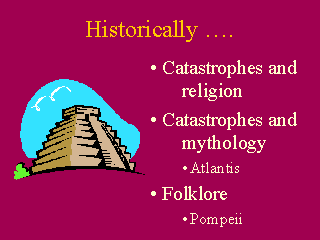| front |1 |2 |3 |4 |5 |6 |7 |8 |9 |10 |11 |12 |13 |14 |15 |16 |17 |18 |19 |20 |21 |part2|review |
 |
- The fatalistic notion of disasters probably arises from the
manner in which disasters have been portrayed throughout history. Foremost, disasters have
commonly been linked to religion. A popular perception today is that disasters represent
an “Act of God”. Historically, this notion has strong ties to religious
teaching. The flood of 40 days and 40 nights (Noah’s Ark) is one example. Another
example was the view of many cultures (e.g. Incan, Mayan) that volcanoes represented the
power of the gods. Several individuals were sacrificed into volcanoes as an offering of
gifts to the gods. - The catastrophic nature of disasters has also led to the evolution of disasters as a part of folklore and mythology. We all have been taught about the destruction of Pompeii in 79AD by a volcano. The myth surrounding the underwater community of Atlantis originates from a disaster. - An overriding consequence of this history is the thought that there is little that we can do to prevent disasters. The goal of this lecture is to put an end to this perception. While it may not be possible to prevent a volcano from exploding, or a hurricane from forming, there are, in fact, several steps that we can take to reduce the likelihood for disasters or reduce the loss of life and injuries associated with disasters when they occur. |